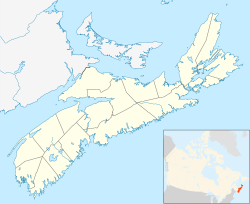Arichat, Nova Scotia
| Arichat | |
|---|---|
| Village | |

The island community of Arichat, Isle Madame, Nova Scotia as seen from Cannon Look-Off. These cannons commemorate the eighteenth century period of the community's long history.
|
|
| Coordinates: 45°30′40.17″N 61°0′46.5″W / 45.5111583°N 61.012917°W | |
| Country |
|
| Province |
|
| District | Richmond County |
| Established | 1785 |
| Government | |
| • Type | Village |
| Time zone | EST (UTC-4) |
| • Summer (DST) | AST (UTC-4) |
| Postal code span | B0E |
| Area code(s) | 902 |
| Website | http://www.arichat.ca/fr/acceuil.php |
Arichat is a Canadian village in Nova Scotia. It is one of the oldest communities in the province, dating back to the 18th century.
It is a district of Richmond County on Isle Madame and is currently the seat of the Municipality of Richmond County.
The Mi'kmaq name "Nerichat" eventually became Arichat. On some early plans it is found as "Nerichau." West Arichat was at one time named Acadiaville, as some of the Acadians after their expulsion from Grand Pre, settled in this area. Indigenous peoples also had the name of "Liksake" for Arichat, meaning worn rocks, also "ehksake" meaning "the camping ground."[1]
Arichat is located on what forms a protected natural harbour. As such, it was an important gem in the maritime province of New France, along with the contemporary capital of Ile Royale, Louisbourg.
After the British victory in the Seven Years' War, Arichat would be an valuable port in the fishery trade, the emperors of which were Charles Robin and John Janvrin, amongst others.
During the American Revolution, on 22 September 1776, Canso, Nova Scotia was attacked by American privateer John Paul Jones - the Father of the American Navy. The privateer sailed on the USS Providence and destroyed fifteen vessels, and damaged much property on shore. There he recruited men to fill the vacancies created by manning his prizes, burned a British fishing schooner, sank a second, and captured a third besides a shallop which he used as a tender. Jones then pillaged the community of Petit-de-Grat and Arichat and then returned to Boston.
...
Wikipedia

